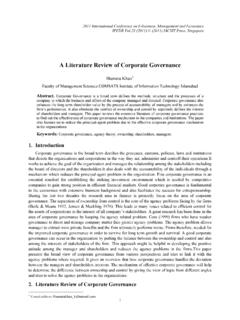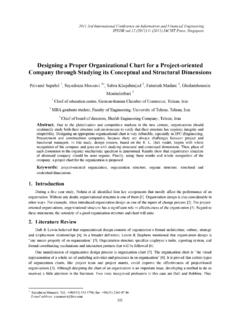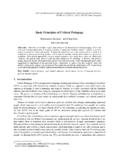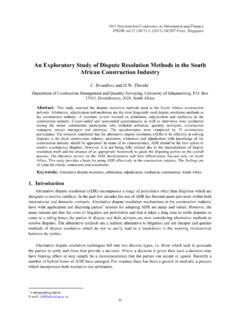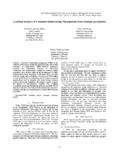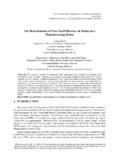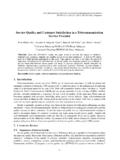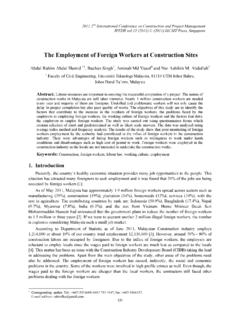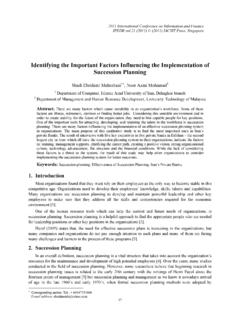Transcription of Grammar, Syntax, Semantics and Discourse - IPEDR
1 grammar , syntax , Semantics and Discourse + 1 Kingston Engineering College, Katpadi, Vellore Dis, Abstract. The paper contains a significant role of grammar , syntax , Semantics and Discourse in the use of English language. It focuses on the role of four different categories but one single issue of handling the language efficiently using these conventional elements as well it concentrates on the issue of exhibiting Style of oneness, the impact of science as equal to language trying to prove that linguistics part of a language is a ever changing trend according to the change of nature, etc. Keywords: grammar , syntax , Semantics and Discourse ,etc. 1. Introduction English grammar is a description of the usages of the English language by good speakers and writers of the present day.
2 -Whitney A description of account of the nature, build, constitution, or make of a language is called its grammar Meiklejohn grammar teaches the laws of language, and the right method of using it in speaking and writing. -Patterson grammar is the science of letter; hence the science of using words correctly. -Abbott The English word grammar relates only to the laws which govern the significant forms of words, and the construction of the sentence. -Richard Grant White These are sufficient to suggest several distinct notions about English grammar - (1) It makes rules to tell us how to use words. (2) It is a record of usage which we ought to follow. (3) It is concerned with the forms of the language. (4) English has no grammar in the sense of forms, or inflections, but takes account merely of the nature and the uses of words in sentences.
3 Fierce discussions have raged over these opinions, and numerous works have been written to uphold the theories. The first of them remained popular for a very long time. It originated from the etymology of the word grammar (Greek gramma, writing, a letter), and from an effort to build up a treatise on English grammar by using classical grammar as a model. Perhaps a combination of (1) and (3) has been still more popular, though there has been vastly more classification than there are forms. During recent years, (2) and (4) have been gaining ground, but they have had hard work to displace the older and more popular theories. It is insisted by many that the student's time should be used in studying general literature, and thus learning the fluent and correct use of his mother tongue.
4 It is also insisted that the study and discussion of forms and inflections is an inexcusable imitation of classical treatises. Which view shall the student of English accept? Before this is answered, we should decide whether some one of the above theories must be taken as the right one, and the rest disregarded. + Corresponding author. Tel.: + 9655694942. E-mail address: 1662012 International Conference on Language, Medias and CultureIPEDR (2012) (2012)IACSIT Press, SingaporeThe real reason for the diversity of views is a confusion of two distinct things,-what the definition of grammar should be, and what the purpose of grammar should be. The province of English grammar is, rightly considered, and wider than is indicated by any one of the above definitions; and the student ought to have a clear idea of the ground to be covered.
5 It must be admitted that the language has very few inflections at present, as compared with Latin or Greek; so that a small grammar will hold them all. It is also evident, to those who have studied the language historically, that it is very hazardous to make rules in grammar : what is at present regarded as correct may not be so twenty years from now, even if our rules are founded on the keenest scrutiny of the "standard" writers of our time. Usage is varied as our way of thinking changes. In Chaucer's time two or three negatives were used to strengthen a negation; as, "Ther nas no man nowher so vertuous" (There never was no man nowhere so virtuous). And Shakespeare used good English when he said more elder ("Merchant of Venice") and unkindest ("Julius C sar"); but this is bad English now.
6 If, however, we have tabulated the inflections of the language, and stated what syntax is the most used in certain troublesome places, there is still much for the grammarian to do. Surely our noble language, with its enormous vocabulary, its peculiar and abundant idioms, its numerous periphrastic forms to express every possible shade of meaning, is worthy of serious study, apart from the mere memorizing of inflections and formulation of rules. grammar is eminently a means of mental training; and while it will train the student in subtle and acute reasoning, it will at the same time, if rightly presented, lay the foundation of a keen observation and a correct literary taste. The continued contact with the highest thoughts of the best minds will create a thirst for the "well of English undefiled.
7 " Coming back, then, from the question, What ground should grammar cover? we come to answer the question, What should grammar teach? and we give as an answer the definition,- English grammar is the science which treats of the nature of words, their forms, and their uses and relations in the sentence This will take in the usual divisions, "The Parts of Speech" (with their inflections), "Analysis," and " syntax . It will also require a discussion of any points that will clear up difficulties, assist the classification of kindred expressions, or draw the attention of the student to everyday idioms and phrases, and thus incite his observation. A few words here as to the authority upon which grammar rests. The statements given will be substantiated by quotations from the leading or "standard" literature of modern times; that is, from the eighteenth century on.
8 This literary English is considered the foundation on which grammar must rest. Here and there also will be quoted words and phrases from spoken or colloquial English, by which is meant the free, unstudied expressions of ordinary conversation and communication among intelligent people. These quotations will often throw light on obscure constructions, since they preserve turns of expressions that have long since perished from the literary or standard English. Occasionally, too, reference will be made to vulgar English,-the speech of the uneducated and ignorant,-which will serve to illustrate points of syntax once correct, or standard, but now undoubtedly bad grammar . The following pages will cover, then, three divisions:- Part I. The Parts of Speech and Inflections.
9 Part II. Analysis of Sentences. Part III. The Uses of Words, or syntax . Here is the list of few significant parts of grammar been discussed forthwith: Traditional grammar classifies words based on eight parts of speech: the verb, the noun, the pronoun, the adjective, the adverb, the preposition, the conjunction, and the interjection. 1672. Syntex In linguistics, syntax (from Ancient Greek "arrangement" from syn, "together", and t xis, "an ordering") is the study of the principles and rules for constructing phrases and sentences in natural languages. In addition to referring to the overarching discipline, the term syntax is also used to refer directly to the rules and principles that govern the sentence structure of any individual language, as in "the syntax of Modern Irish.
10 " Modern research in syntax attempts to describe languages in terms of such rules. Many professionals in this discipline attempt to find general rules that apply to all natural languages. The term syntax is also used to refer to the rules governing the behavior of mathematical systems, such as formal languages used in logic. See syntax (logic); Computer-programming languages; syntax (programming languages). Though there has been an interplay in the development of the modern theoretical frameworks for the syntax of formal languages and natural languages, this article surveys only the latter. 3. Early History Works on grammar were written long before modern syntax came about; the A dhy y of P ini is often cited as an example of a premodern work that approaches the sophistication of a modern syntactic theory.
